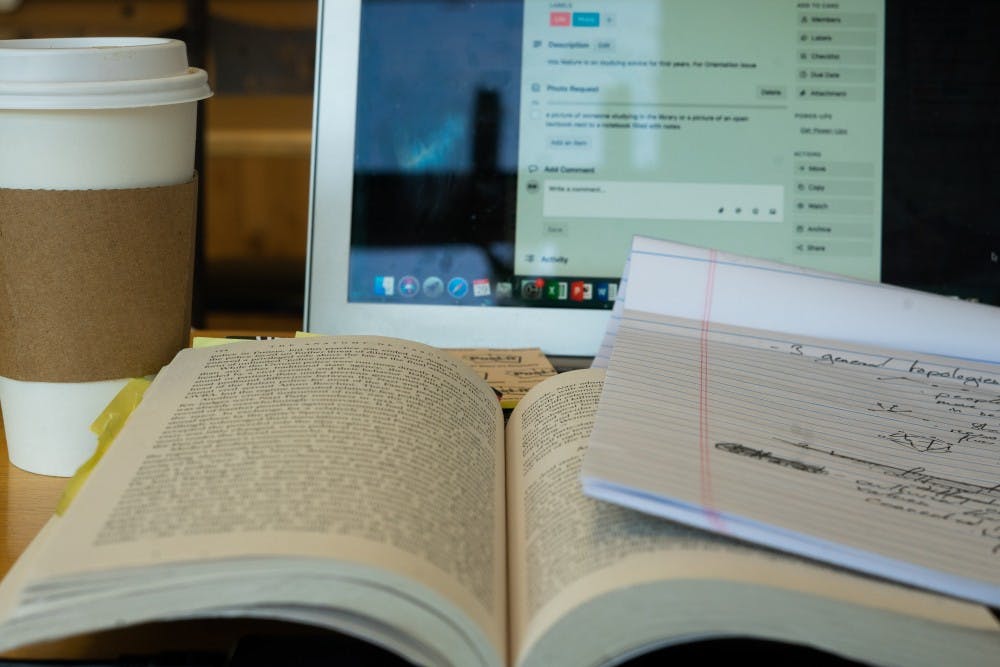When transitioning from high school to college, many students find themselves stunned when they encounter huge lectures, 10-page research papers, four exams in a given week and only eight hours of available study time at the end of every class day. To manage the often overwhelming adjustment to studying at the college level, University students provided a few suggestions.
Find a study spot
No one type of study space works for everyone. Some students may thrive on the hustle and bustle of a packed library, while others may need silence to get anything done. In choosing where to study, University students will find different spaces around Grounds that work best for them.
Larger, more public study locations include 1515 on the Corner, Nau/Gibson Hall — complete with a Starbucks on the bottom floor — and the second floor of Clemons Library, often referred to as “Clem two.”
For those seeking quieter study spots, third-year College student Drew Rollins recommends the Alderman stacks, which consists of desks tucked away amongst bookshelves in Alderman Library.
“I really like being surrounded by books, and I feel studious — and I don’t have any distractions,” Rollins said.
Study smart, not hard
Many students have heard the old phrase “don’t cram the night before an exam.” In college, this classic tip takes on new meaning, as exams tend to cover larger chunks of material than they did in middle and high school.
“It definitely requires a lot of self control and dutifulness to study a couple weeks in advance,” Rollins said. “But when you do, you know the information so much better, and then the night before isn’t … the worst night of your life.”
Additionally, trying to memorize every little piece of information for a class is not always the most efficient form of preparation, according to third-year College student Areesheh Khan.
“[First year] I think I studied harder and not smarter,” Khan said. “I would transcribe everything, like textbook notes … things that were said in lecture … [Study] the important information rather than all the information.”
Reading is never a substitute for attending lecture and vice versa
With massive lectures that don’t take attendance, the burning temptation to skip class often arises. But according to Khan, going to class on top of completing the assigned reading is paramount.
“There were times when I would … accidentally miss a lecture and … it did affect how much I was able to retain from the textbook,” Khan said.
Study in groups but avoid unnecessary distraction
Studying with friends is a hallmark of many students’ college experiences. Friends may remind one another to stay on track and provide much-needed moral support when the workload is especially rigorous. According to Rollins, there is a lot of camaraderie in studying with others.
However, the presence of friends may become distracting and hinder students’ ability to finish classwork efficiently. To avoid this, some students use the “sprint” method, whereby groups of friends allocate a chunk of time for studying and then a shorter chunk of time for a study break.
“[It’s] like 20 or 30 minutes studying, then you get a five minute break where you can talk,” third-year College student Zoe Lewczak said. “We would all set alarms on our phones so that we knew we were sticking to the schedule.”
In the age of smartphones, alerts and notifications may also be distracting when trying to study or complete homework. According to Lewczak, sometimes the best way to eliminate this type of distraction is to simply power down your device for a few minutes.
“Set your phone to airplane mode, and you won’t get notifications,” Lewczak said.
Ask for help
The University provides students with resources to fall back on for guidance, whether it be for reassurance or a voice of reason. For Rollins, the Career Center provided such a voice.
“I went to the Career Center office in 1515 upstairs,” Rollins said. “They helped me pick classes, and … the general vibe was like, ‘You’re going to be fine, here’s some help.’ So I appreciated it.”
Students may also attend professors’ office hours for help with classes or to enrich their experiences in a course — a tactic that third-year College student Shannon Colson recommends.
“If I have an assignment or I have an essay, I always finish it early and then bring it to the teacher before it’s turned in,” Colson said. “It kind of helps to establish the expectations … [And] if it’s a class that is relevant to your major, I think it’s always just good to go in and introduce yourself.”







